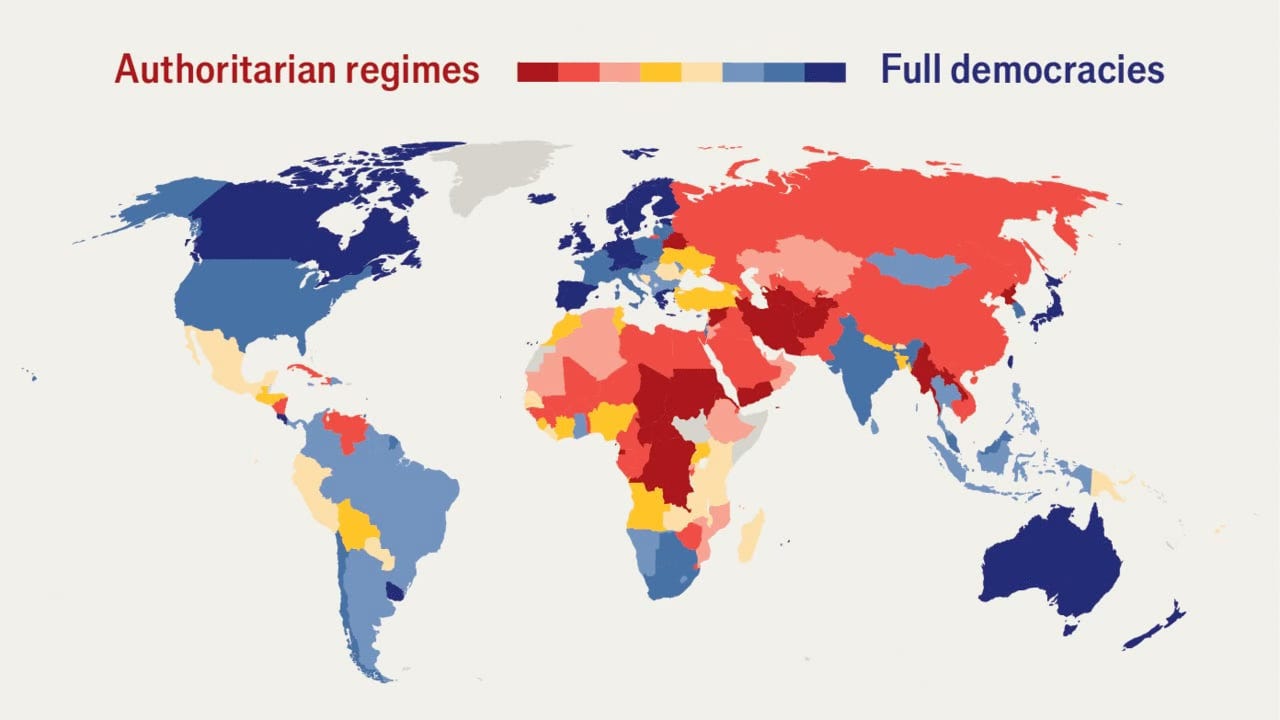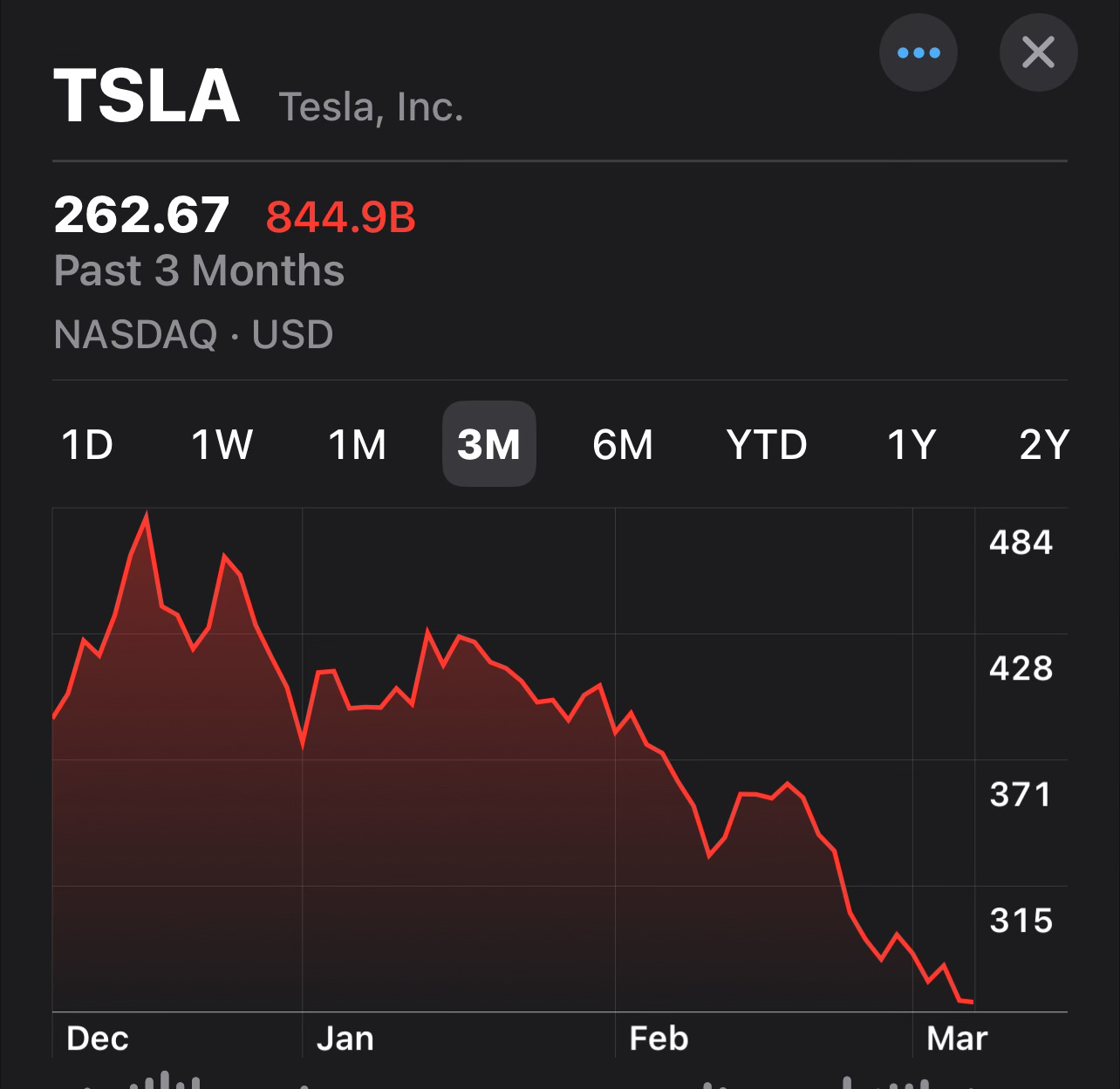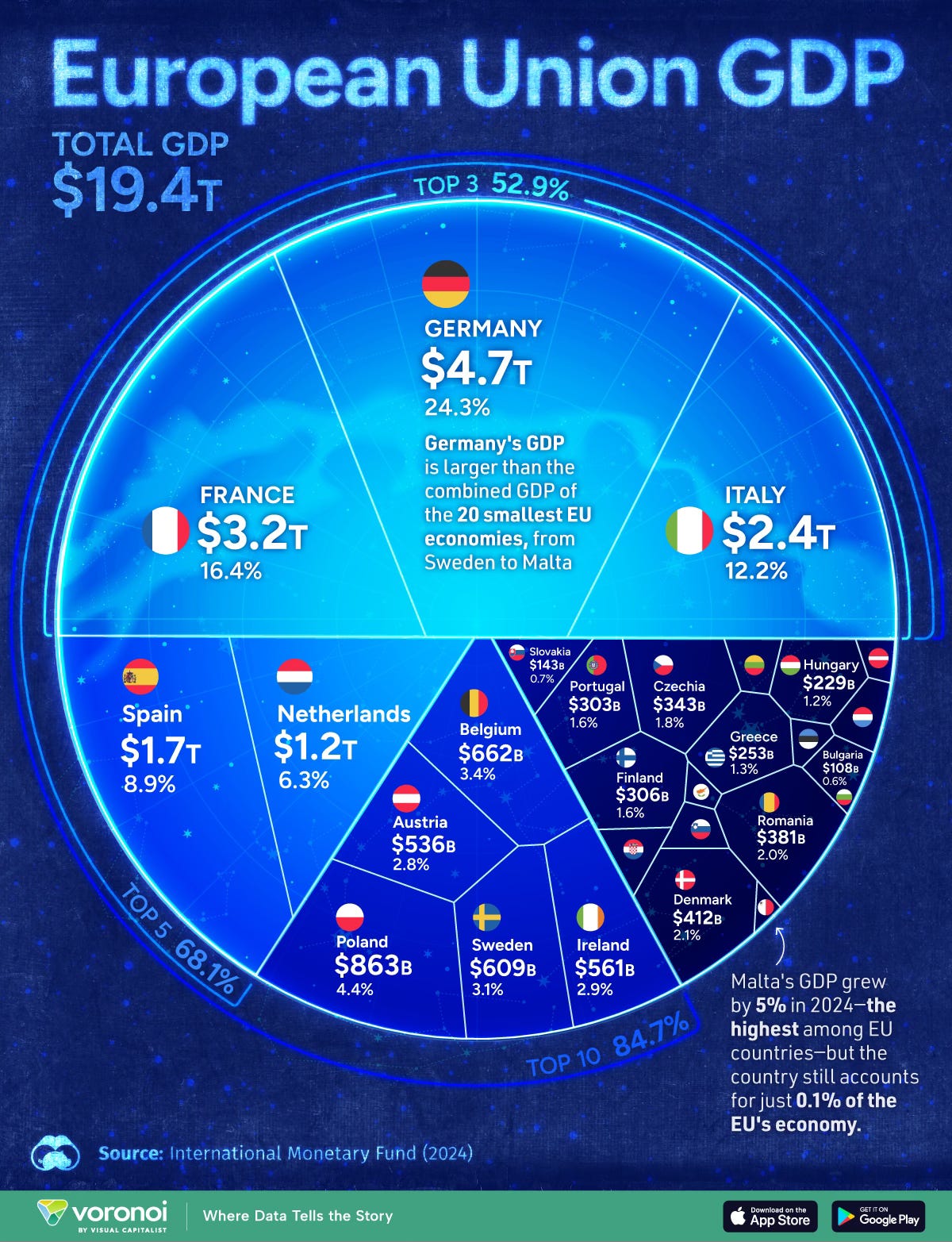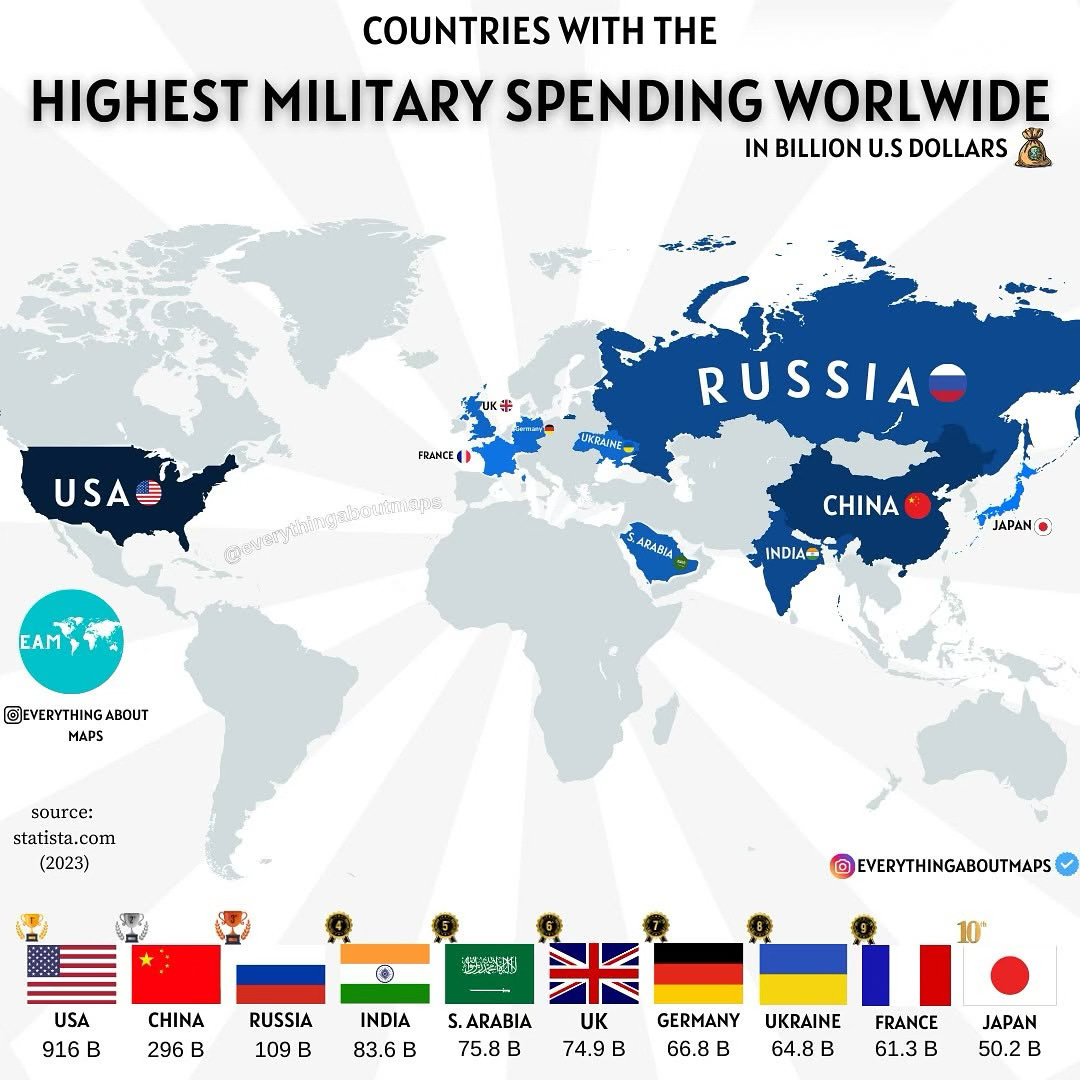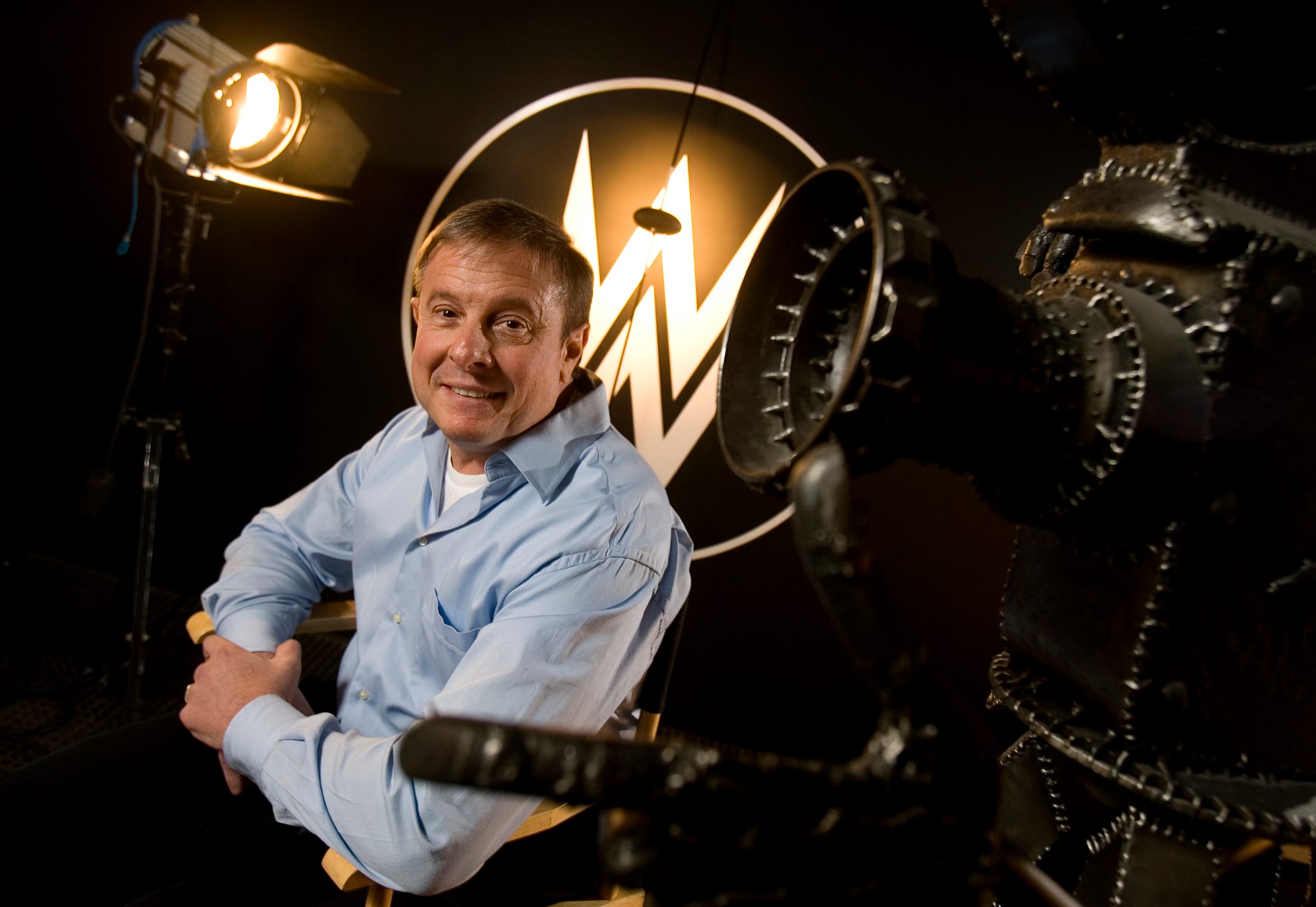Bugs Bunny on Tariffs
No further comments on tariffs this week. Except maybe this.
Tesla’s Demise
The same type of person who buys an electric car— rich and eco-liberal— is the same type of person who despises Elon Musk’s political antics. People are giving up leases on their Teslas. They might not like the sight of the world’s richest man firing people who make peanuts. And it isn’t just Tesla drivers. I have a friend who refused to get into an Uber because it was a Tesla.
Tesla is the number one electric car maker in the world and its Model Y, parked above, the best seller. It is now facing more competition along with the publicity. Giving a Nazi salute has not been good for sales in Europe. “In February, Tesla new-vehicle registrations plummeted by 76.3% in Germany and 26% in France, according to government and industry association data,” writes the Wall Street Journal.
“It takes years, sometimes decades to build up a brand’s reputation, and just seconds to destroy it.” Forbes.
To say nothing of Tesla’s stock price.
That is a high of $484 on December 17, my birthday, to close at $262 on Friday. It was actually off just 78 cents on Friday so it may pop higher on Monday. A bargain?
Insiders are dumping the stock, incluidng this guy, Vaibhav Taneja, Tesla’s head of finance, who sold $8-million worth of stock in the last three months.
The Forbes article has some amusing photos of Tesla drivers apologizing for owning one of Elon’s cars or disguising it; this Tesla is masquerading as an Audi.
Elon Musk may not care. With that pile of money he will probably never run short. And he has other irons in the fire such as Space X. But judging by a story in the New York Times on Friday, his love affair with Donald Trump is souring after a shouting match with Secretary of State Marco Rubio. Musk wore a suit to that meeting after the Ukrainian president was mocked for wearing his fatigues by Marjorie Taylor Greene’s rude boyfriend and play reporter in the Oval office grilling session.
Speaking of Work
Shocking, but not surprising, where women are not allowed to work.
The Euro
If Europe plans to go it alone on defence it is going to have to spend a lot more money on the military. And the three big countries will have to do the heavy lifting.
Who Spends Now
Comparing the two Largest Countries, Russia and Canada
Canada is by some measures richer than Russia, though we are looking at perhaps a more honest measure here. Individual Canadians (per capita GDP) are much richer than Russians. Hard to know how Russia can continue spending on war. Here are numbers from the CIA World Factbook.
Canada
Real GDP (purchasing power parity)
$2.242 trillion (2023 est.)
Real GDP per capita
$55,900 (2023 est.)
Military expenditures
1.4% of GDP (2024)
Russia
Real GDP (purchasing power parity)
$5.816 trillion (2023 est.)
Real GDP per capita
$39,800 (2023 est.)
Military expenditures
5% of GDP (2023 est.)
Essay of the Week
Paul Bronfman was rebellious as a teenager. He insisted on wearing a blue Toronto Maple Leafs sweater to the Montreal Forum, shrine of the Montreal Canadiens, a team owned at the time by his father, Edward, and his uncle Peter. He wasn’t allowed to sit in the owner’s box behind the players’ bench but was banished to the other side of the arena.
Mr. Bronfman showed that contrarian streak when he built an empire in the Canadian film and television production business, including the largest production equipment company and the biggest studio and sound stage in Canada.
He was a member of the famous Canadian Bronfman business dynasty, but carved his own success in the film business, producing movies and television series, building the largest film equipment supplier in Canada and developing major film studios. Mr. Bronfman died in Toronto on Feb. 26 at the age of 67 after living with multiple sclerosis for more than 30 years.
Paul Bronfman was born in Montreal on May 28, 1957. The family made its fortune in the liquor business, especially Seagram Co. Ltd. His grandfather was Allan Bronfman, brother of the legendary Sam Bronfman; Paul’s father, Edward, was one of the two brothers who started Edper, the successful conglomerate that morphed into Brookfield Asset Management. He was a cousin of Edgar Bronfman Jr. who was the former CEO of Seagram and Warner Music.
Paul Bronfman forged his own success in the film business working from the ground up. After attending St. George’s School of Montreal, a private school, he studied at the University of Toronto.
Mr. Bronfman was a roadie for the Canadian group April Wine and then an assistant production manager for the British group Supertramp.
He enjoyed Toronto as a student and when he was 20, he packed up a U-Haul and headed to Toronto full time. He landed a job at Pathé Sound in film sound post-production. It was a division of Astral Bellevue Pathé Inc., founded and controlled by Harold Greenberg, a legend in the film business and a mentor to young Mr. Bronfman, who eventually became one of the largest shareholders of Astral, which in turn became one of the most important entertainment companies in Canada.
One of the personal reasons for his move from Montreal was the family connection. You might think being a member of one of the most famous business families in the country would launch you into success. But the Bronfman name could be a disadvantage, especially in the tight-knit world of anglophone Montreal.
“To me it is the curse of the last name. People have preconceived notions about you, good and bad. It is one of the reasons I left Montreal [at age 20] to get out of that little glass bubble there. I loved Toronto the day I got here. People like me for what I am, and I have always wanted to make my own name, my own place in life,” Mr. Bronfman told The Globe and Mail’s Gordon Pitts in 2009.
Mr. Bronfman’s move to Toronto came at a time when there was a burgeoning film industry, funded by government tax credits, with accountants, producers, aspiring screenwriters, actors and assorted hustlers doing deals in places like Club 22 in Toronto’s Windsor Arms Hotel.
“I’m a member of the family of black sheep we call the film industry in Canada. We are people who didn’t want to, or couldn’t, conform to normal businesses and normal jobs, so we all ended up in this industry. Most of us fell into it by accident,” Mr. Bronfman told The Globe.
In 1988, Mr. Bronfman took an opportunity to do his first big deal with producer Stephen Cannell to build North Shore Studios in Vancouver. He started his own holding company, Comweb, to build the studio that would eventually be where The X-Files series was produced. The studio became a major draw for American producers. Mr. Bronfman was on his way to becoming a big-time player in Canadian film and television production, though he sold his position in the studio to Lionsgate in 1997.
At this stage Mr. Bronfman was married to the former Judy Nathan, his high school sweetheart, and moved to a house in Forest Hill. He mortgaged his house to buy William F. White, the company that provides everything from cameras to lighting equipment to film and television companies across Canada. If there is a film shot on location in a Canadian city, the trucks of William F. White will be parked on the street, with cables snaking across the sidewalks and lawns of neighbourhoods that are part of the story.
Mr. Bronfman sold that business in 2019, just four months before COVID-19 started and devastated the film production business. It was a rare stroke of luck for him.
Mr. Bronfman was diagnosed with multiple sclerosis in 1995. At first, he tried to hide it and didn’t tell anyone he had the disease.
“I lied a lot, and said my ankle was sore, my knee was sore. It’s pretty normal because you don’t want people to feel sorry for you. You don’t want people to treat you differently. But now, it is what it is,” he told The Globe in 2009.
Eventually the physical deterioration started to show, things such as not being able to hold a fork.
Mr. Bronfman told the National Post in 2010 that although his MS affected his body, it did not affect his mind. “My brain is fine. It’s all the spinal cord. Thank God I can still come to the office, do what I was doing, work and travel, just a bit slower.”
His friends and colleagues say he refused to let the disease sideline him.
“He didn’t let it slow him down,” said Daniel Lyon, a former executive at Telefilm Canada who worked with Mr. Bronfman at Astral when they were both starting out. “Paul would go to industry events and his chair had an elevator. He could press a button, and the chair would raise so that if a person was standing up, Paul was looking at them eye to eye.”
That special chair was made by techniciains at William F. White.
William F. White did most of its business in Canada but did do some work in the United States. In 1992, Mr. Bronfman did a deal to open a camera and equipment firm in Budapest with Hungarian cinematographer Vilmos Zsigmond, who worked on Close Encounters of the Third Kind and The Deer Hunter, among other things.
Perhaps his biggest contribution to Canada’s film production business was as founder and chairman of Pinewood Toronto Studios, which was built on Toronto’s Portlands in 2008.
“It is the largest purpose-built studio in Canada and boasts the largest single sound stage in North America,” his son Jonathan Bronfman said. “But my father’s greatest achievement is his business success, which came in spite of the physical challenges he faced.”
“Paul Bronfman was more than an entrepreneur, he was a force of nature in our industry,” wrote Warren Sonoda, president of the Director’s Guild of Canada who singled out William F. White and Pinewood Toronto Studios. “He helped build infrastructure that supports Canadian film crews every day.”
In July of 2010 the Queen and Prince Philip toured the Canadian studio, which was named after a famous British studio, and stayed for lunch. In an interview with The Hollywood Reporter in 2022, Mr. Bronfman explained to the Queen why he didn’t stand during God Save the Queen. “As the Queen sat down, I said, ‘Your Majesty, my apologies for not standing as I have MS.’ She just looked at me and, without batting an eyelid, said, ‘That must be slightly inconvenient.’”
Mr. Bronfman supported a number of organizations including the Toronto International Film Festival (where he hosted an annual William F. White party), the Atlantic Film Festival, the Banff World Media Festival and Norman Jewison’s Canadian Film Centre. He was on the board of directors of the Academy of Canadian Cinema and Television and raft of other industry groups.
He was also a member of Academy of Motion Picture Arts and Sciences in the United States, the ones who vote on the Oscars. At his funeral, on the day of the Academy Awards, his son Jonathan said his father voted for The Brutalist as Best Picture. (It lost.)
“Paul was also a strong supporter and board member at Film Ontario, an industry consortium that advocates for the Ontario screen industry,” wrote ACTRA Toronto, the union that represents performers. “Many members of ACTRA Toronto have been greatly affected by Paul’s generosity towards our industry.”
Mr. Bronfman was well known for helping younger people trying to break into the film and television business. He would take them to lunch and give them advice and sometimes give them a break on equipment rentals.
“As part of Film Ontario, Paul was one of the strongest individual lobbyists for our industry,” his longtime friend Mr. Lyon said. “When there was a discussion about tax credits and the film industry, Paul would explain just how much they did for the economy of Ontario.”
Mr. Bronfman leaves his children, Alexandra, Jonathan and Andrew; his brothers, David and Brian; and six grandchildren.





